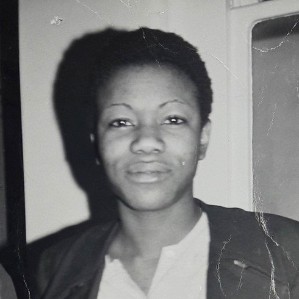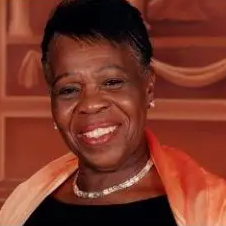Triple oppression, also called double jeopardy, Jane Crow, or triple exploitation, is a theory developed by black socialists in the United States, such as Claudia Jones. The theory states that a connection exists between various types of oppression, specifically classism, racism, and sexism. It hypothesizes that all three types of oppression need to be overcome at once.
David Dabydeen FRSL is a Guyanese-born broadcaster, novelist, poet and academic. He was formerly Guyana's Ambassador to UNESCO from 1997 to 2010, and was the youngest Member of the UNESCO Executive Board (1993–1997), elected by the General Council of all Member States of UNESCO. He was appointed Guyana's Ambassador Plenipotentiary and Extraordinaire to China, from 2010 to 2015. He is one of the longest serving diplomats in the history of Guyana, most of his work done in a voluntary unpaid capacity.

Olive Elaine Morris was a Jamaican-born British-based community leader and activist in the feminist, black nationalist, and squatters' rights campaigns of the 1970s. At the age of 17, she claimed she was assaulted by Metropolitan Police officers following an incident involving a Nigerian diplomat in Brixton, South London. She joined the British Black Panthers, becoming a Marxist–Leninist communist and a radical feminist. She squatted buildings on Railton Road in Brixton; one hosted Sabarr Books and later became the 121 Centre, another was used as offices by the Race Today collective. Morris became a key organiser in the Black Women's Movement in the United Kingdom, co-founding the Brixton Black Women's Group and the Organisation of Women of African and Asian Descent in London.
Race Today was a monthly British political magazine. Launched in 1969 by the Institute of Race Relations, it was from 1973 published by the Race Today Collective, which included figures such as Darcus Howe, Farrukh Dhondy, Linton Kwesi Johnson, Leila Hassan and Jean Ambrose. The magazine was a leading organ of Black politics in 1970s Britain; publication ended in 1988.
Lauretta Ngcobo was a South African novelist and essayist. After being in exile between 1963 and 1994 – in Swaziland, then Zambia and finally England, where she taught for 25 years – she returned to South Africa and lived in Durban. Ngcobo's writings between the 1960s and early 1990s have been described as offering "significant insights into the experiences of Black women of apartheid's vagaries". As a novelist, she is best known for And They Didn't Die (1990), set in 1950s South Africa and portraying "the particular oppression of women who struggle to survive, work the land and maintain a sense of dignity under the apartheid system while their husbands seek work in the mines and cities."
Rita Keegan is an American-born artist, lecturer and archivist, based in England since the late 1970s. She is a multi-media artist whose work uses video and digital technologies. Keegan is best known for her involvement with in the UK's Black Arts Movement in the 1980s and her work documenting artists of colour in Britain.
Stella Dadzie is a British educationalist, activist, writer and historian. She is best known for her involvement in the UK's Black Women's Movement, being a founding member of the Organisation of Women of African and Asian Descent (OWAAD) in the 1970s, and co-authoring with Suzanne Scafe and Beverley Bryan in 1985 the book The Heart of the Race: Black Women's Lives in Britain. In 2020, Verso published a new book by Dadzie, A Kick in the Belly: Women, Slavery & Resistance.
Black Ink Collective was a British publishing company founded in 1978 to publish the work of young Black writers in the UK.

Amryl Johnson was a writer born in Trinidad who lived most of her life in Britain.
The British Black Panthers (BBP) or the British Black Panther movement (BPM) was a Black Power organisation in the United Kingdom that fought for the rights of black people and racial minorities in the country. The BBP were inspired by the US Black Panther Party, though they were unaffiliated with them. The British Panthers adopted the principle of political blackness, which included activists of black as well as South Asian origin. The movement started in 1968 and lasted until around 1973.

Why I'm No Longer Talking to White People About Race is a 2017 debut book by British writer Reni Eddo-Lodge that was published by Bloomsbury Publishing.
Beverley Bryan is a Jamaican educationist and retired academic who was a professor of language education at the University of the West Indies in Mona. Settling in Britain with her parents in the late 1950s, she went on to become a founding member of the Brixton Black Women's Group and co-authored the 1985 book The Heart of the Race: Black Women's Lives in Britain.
Elizabeth Obi is a British activist who was involved in the feminist, black nationalist, and squatters' rights campaigns of the 1970s. A close friend of Olive Morris, in 2009 she founded the Remembering Olive Collective, which researches and documents Morris's life.
The Martin Luther King Memorial Prize was instituted by novelist John Brunner and his wife and was awarded annually to a literary work published in the US or Britain that was deemed to improve interracial understanding, "reflecting the ideals to which Dr. Martin Luther King dedicated his life". As of 1984, the author of the winning work was awarded £100. Brunner died in 1995, and it is uncertain if the award has continued.
Lola Olufemi is a British writer. She is an organiser with the London Feminist Library, and her writing has been published in many national and international magazines and newspapers. She is the author of Experiments in Imagining Otherwise and Feminism, Interrupted: Disrupting Power, and the co-editor of A FLY Girl's Guide to University: Being a Woman of Colour at Cambridge and Other Institutions of Power and Elitism.
The Brixton Black Women's Group (BWG) was an organisation for Black women in Brixton. One of the first Black women's groups in the UK, the BWG existed from 1973 to 1985. A socialist feminist group, it aimed to raise consciousness and organise around issues specifically affecting Black women.
Kath Locke (1928–1992) was a mixed-race British community leader and political activist based in Manchester. Active in Moss Side community politics, she helped to establish the George Jackson House for homeless children in 1973. In 1980, Kath Locke was a co-founder of the Abasindi Co-operative, a community organisation run by Black women. During the 1980s, the Abasindi Co-operative was a hub for many educational and cultural programs for the local African and Afro-Caribbean community, operating out of the Moss Side People's Centre. The 1995 documentary film We Are Born to Survive tells the story of Kath Locke's political life. The Kath Locke Centre in Moss Side is named after her.
Gerlin Bean is a Jamaican community worker who was active in the radical feminist and Black nationalist movements in the United Kingdom in the 1960s and 1970s. Trained as a nurse, she became a dedicated community activist and social worker, involved in the founding of the Black Women's Action Committee of the Black Unity and Freedom Party, the women's section of the Black Liberation Front, the Brixton Black Women's Group, and the Organisation of Women of African and Asian Descent (OWAAD). Bean's work and activism focused on eliminating discriminatory policies for people of colour, women, and people with disabilities. She fought for equal educational opportunity, fair wages, adequate housing, and programmes that supported families, such as counselling services, child care, and health care.

Florence Tina "Gloria" Cameron was a Jamaican-born British community worker, activist and promoter of West Indian culture. Born and raised in Kingston, Jamaica, she emigrated to England as part of the "Windrush generation". In 1958, she joined the St John's Inter-Racial Club in the Brixton district of London and became involved in activism directed at widespread discrimination against the West Indian community. Her concerns included accommodation problems, educational disparity, racial discrimination in employment, transport, and pubs, as well as Sus laws, which allowed police to detain people upon suspicion that they might have committed an offence.
Gwendolyn Enid "Gee" Bernard was the first Black councillor for Croydon in London for the Labour Party.




